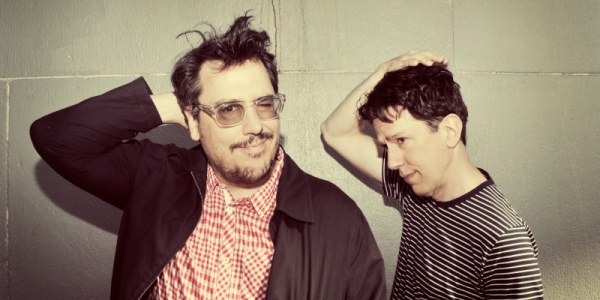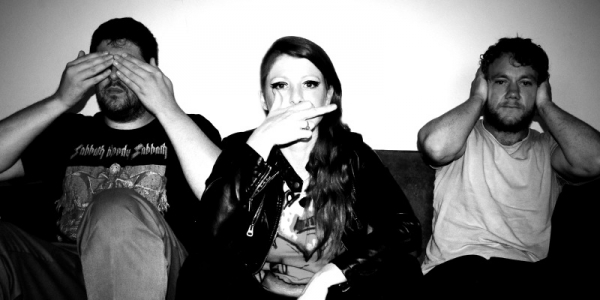Flansburgh had grown up in Massachusetts which, courtesy of Jonathan Richman, had a significant role in the American punk scene of the early ’70s. “I hadn’t gone to England by accident – there was a bit of a punk scene in Boston, and also New York, and I was very conscious of punk bands at that time,” Flansburgh says.
While New York had its own thriving underground punk scene featuring The Dictators, The Ramones, Richard Hell, Television and Blondie – the English punk scene – courtesy of Malcolm McLaren was far more in your face. “In England a lot of bands were having a difficult time doing shows outside of clubs. I got to see Elvis Costello’s first performance, and he seemed really happy to get the applause. It sounds corny to say, but it was a real ‘stars born event’ – there was about 200 people there, and no-one walked out. When I saw him six months later in the US, he’d completely changed into the Elvis Costello that everybody knew.”
Flanburgh had already met his eventual musical partner in They Might Be Giants, John Linnell. “John was a year older than me, and he was really cool, in that way when you’re 12 that you can think that of a 13– as cooler,” Flansburgh laughs. “John and his best friend Dan were a radical cultural presence in the school – they had long hair, and they did these mimeographed underground comics.”
The name Flansburgh and Linnell took for the band they formed in 1982 was taken from a 1971 film starring George C Scott – which had borrowed the line from a passage in Don Quixote. With the duo’s evolution as a band, and gradual development of its cult following, the name has taken on a certain prophetic resonance – though Flansburgh is careful to avoid making too much of it. “I probably have the worst perspective on the name!” Flansburgh laughs. “We initially thought of it as pessimistic, but others have interpreted it as really positive. I think the good thing about the name is that it makes people think – I suppose it’s turned out remarkably well.”
Over their subsequent 30-year career, They Might Be Giants have established a reputation for innovation and iconoclasm, both in the band’s blend of quirky music and insightful lyrics, and its willingness to explore lateral approaches to distributing its music. In 1984 They Might Be Giants won an award for the distinctive music for Don’t Let’s Start; later in the decade, the band came up with the truly innovative Dial-A-Song scheme, in which fans would ring a number and listen to the band’s new songs on an answering machine. “We haven’t had a lot of other mechanisms behind the band to get our music out there,” Flansburgh says. “When we did Dial-A-Song, we didn’t have a record deal. So in a lot of respects, it was as pitiful as it was calculated – you could actually see it as desperation.”
In the early years of the 21st century, They Might Be Giants again bucked the industry trend. While the mainstream music industry confronted the emergence of online access to, and distribution of, music with a combination of brutal lawsuits and apocalyptic rhetoric, They Might Be Giants took the pragmatic approach, establishing their own website, through which fans could download new music. While it might appear Flansburgh and Linnell had seen the benefits of technological change in the context of a radical new business model, Flansburgh is quick to explain – like with the Dial-A-Song scheme – that the website was simply a means of distributing music. “If the music speaks for itself, then if people have access to it, then hopefully they’ll like it,” Flansburgh says. “All of our applications are just ways of getting music out there.”
Earlier this year They Might Be Giants released its latest record, Nanobots. A combination of classic They Might Be Giants three-minute pop songs, punctuated with 20-odd second vignettes, Nanobots sees the band return to their classic, and cult style. (In another interview, Flansburgh is quoted as saying Nanobots is a “fucked up” record – an flattering and provocative description that I was keen to explore further, only to be cut short as I ran short of time at the end of the interview.)
The album includes a song that pays tribute to Nikolai Tesla, the European physicist, inventor and pivotal figure in the development of electricity, X-ray technology and radio transmission. Flansburgh and Linnell had originally been looking at Tesla’s life while composing songs from one of the duo’s children’s records a couple of years ago; whether it was because of the deep physics, or Tesla’s erratic personality, the Tesla song project was deferred until They Might Be Giants returned to its next ‘adult’ record. “He’s a really fascinating figure,” Flansburgh says. “The song started a few years ago when we were doing songs for kids, but the song didn’t really fit with kids, so we left it off that record. He was inspired inventor, and also a troubled figure who always had visions. He could’ve been thrown in the loony bin – he makes Einstein seem normal!” Flansburgh laughs.
BY PATRICK EMERY

